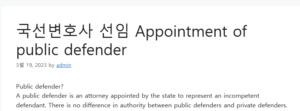Public defender?
A public defender is an attorney appointed by the state to represent an incompetent defendant. There is no difference in authority between public defenders and private defenders. The public defender system supplements the private defender system and is recognized as a system to practically guarantee the right of defense for the suspect and the accused and to realize the principle of equality. Article 12(4) of the Constitution stipulates that anyone who is arrested or detained has the right to receive the assistance of an attorney immediately, and that the State appoints an attorney in accordance with the law when a criminal accused is unable to seek an attorney himself.

When should I appoint a public defender?
1. Cases falling under Article 33 Paragraphs 1, 2 and 3 of the Criminal Procedure Act 국선변호사 선임
-Article 33 Paragraph 1-
When the accused is imprisoned, when the accused is a minor, when the accused is over 70 years old, when the accused is deaf, when the accused is suspected of having a mental or physical disorder, when the accused is sentenced to death, life imprisonment or imprisonment for a term of 3 years or more If there is no defense counsel, the court shall ex officio appoint a defense counsel. 좋은뉴스
-Article 33 Paragraph 2-
If the accused is unable to appoint a defense counsel due to poverty or other reasons, the court shall appoint a defense counsel upon request of the accused. When requesting the appointment of a public defender due to poverty, etc., the accused must submit explanatory materials. However, this is not the case when it is recognized that the cause has been clarified by the record.
-Article 33 Paragraph 3-
When the court deems it necessary for the protection of rights, taking into account the age, intelligence and level of education of the accused, it shall appoint an attorney within the scope not against the express will of the accused.
2. Necessary Attorney Case
In cases falling under Article 33 Paragraph 1 of the Criminal Procedure Act or in which an attorney is appointed pursuant to Articles 33 Paragraph 2 and Article 33 Paragraph 3, the amendment cannot remove the defense counsel, and if the defense counsel does not appear, the court ex officio appoints a defense counsel. should be selected. However, an exception is made when only a judgment is pronounced.
3. Trial process with public participation
In cases in which a participatory trial takes place, if the accused does not have an attorney, the court shall appoint an attorney ex officio.
4. Substantive review of the warrant
If the suspect to be questioned in the substantive examination of the warrant does not have an attorney, the judge of the district court shall ex officio appoint an attorney. When there is no defense counsel because the decision to appoint a defense counsel has been revoked due to reasons such as the circumstances of the defense counsel, the court may ex officio appoint another defense counsel.
5. Adjudication of arrest and detention
If the suspect who has requested the review of suitability for arrest or detention does not have an attorney, the provisions of Article 33 shall apply mutatis mutandis to select a public defender.
6. Reexamination case
In a case where a decision to commence a retrial has become final and conclusive, in the following cases, if the applicant for retrial has not appointed an attorney, the presiding judge shall ex officio appoint an attorney:
-When a request for retrial is made for the deceased or a person with irreversible mental or physical disability,
– When a convicted person dies or becomes irreversibly disabled before the verdict of retrial
7. Trial Preparatory Procedures
The court shall ex officio appoint a defense counsel for a case for which a preparatory trial date has been designated, if there is no defense counsel.
8. Cases under the jurisdiction of military courts
9. Claims for treatment and custody
10. Request for electronic device attachment order
11. Sex crimes and sexual violence against children and adolescents
According to the Children and Youth Act or the Act on Special Cases of Sexual Violence, prosecutors can designate a public defender to protect the rights and interests of victims in criminal proceedings if the victim does not have an attorney.
Qualifications for public defender?
Public defenders are selected from among lawyers, public advocates, and judicial trainees. In case of unavoidable circumstances, a non-lawyer may be selected. If an already appointed or selected public defender fails to appear or leaves the court, if it is unavoidable, the public defender may be selected from among non-attorneys, such as lawyers in adjudication, after hearing the opinions of the accused or suspect.
How many public defenders?
Public defenders appoint one public defender for each defendant or suspect. However, if it is deemed necessary in light of the specificity of the case, several persons may be selected. If there is no conflict of interest between the accused and the suspect, the same public defender may be appointed for the multiple accused or suspect.
Compensation for public defenders?
The public defender may claim daily wages, travel expenses, lodging expenses, and remuneration. Daily wages, travel expenses, and lodging fees paid to public defenders shall be paid only when the public defenders appear on the due date or participate in investigations or dispositions. The remuneration of public defenders is determined by the Supreme Court Justices’ meeting every year within the budget, and the remuneration is paid by instance. However, in case of arrest or adjudication against detention, it is paid separately regardless of the level.